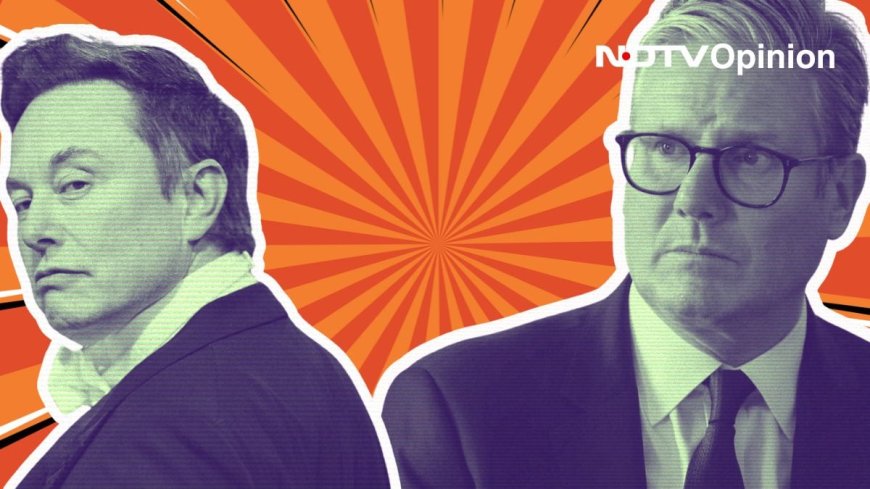Opinion: Why Is UK PM Starmer So Upset With Elon Musk?
The relationship between Musk and Starmer has been frosty at best since the Labour Party came to power in July. Starmer, many believe, is upset with the American billionaire for his unsavoury remarks on how the Labour government handled the riots.


Less than a year ago, tech billionaire Elon Musk was Britain's star guest at a conference, with the then Prime Minister, Rishi Sunak, playing the role of a fawning interviewer to the world's richest man. A year on, things have changed in Britain. The Labour government, which came to power in July, has decided not to invite Musk to a mega investment summit to be held in London on October 14.
The Tesla and X boss ostensibly did not like the snub and hit back at the UK government with full force, urging the guests not to go to the UK. "I don't think anyone should go to the UK when they're releasing convicted paedophiles in order to imprison people for social media posts," he said when he learnt he was not invited.
Origin Story
It is true that many prisoners have been released recently under a government scheme to decongest overcrowded British jails. But there is no evidence to suggest that sex offenders or paedophiles were let out. Musk's tweets have sparked controversy and raised concerns about the spread of misinformation, with the British media reminding the tech billionaire of his recent acts of "spreading disinformation" about the UK. A few weeks ago, Musk shared a baseless report that the UK was building internment camps in the Falkland Islands for rioters, though he swiftly deleted the tweet after facing backlash.
Prime Minister Keir Starmer addressed Musk's latest provocative comments during his recent visit to the UN General Assembly (UNGA) in New York. Dismissing them as being vastly different from the positive feedback received from investors, Starmer claimed that the latter have expressed strong interest in attending and that they praised their meeting with the UK government as the best they've had.
Why The Summit Is Important
The summit - in its third edition since 2021 - aims to attract significant investment to drive economic growth, a top priority for the Labour government. According to a government release, last year's meeting generated a promise of nearly £30 billion of investment. This year, as Chancellor (finance minister) Rachel Reeves and Business and Trade Secretary (minister) Jonathan Reynolds join Starmer in showcasing the UK's potential, the government hopes to secure an investment commitment worth around 60 billion pounds in sectors like technology, green energy and artificial intelligence (AI).
But the elephant in the room is the government's cold shoulder to Musk. It has ignited debate about the UK's true commitment to openness and whether it's willing to engage with influential business leaders who are critical of the Labour government. As the government seeks to reset relations with global trading partners and promote innovation, Musk supporters and the opposition Conservative Party have raised questions about Starmer's willingness to walk the talk. Despite the tech billionaire's inflammatory comments, the Labour government's decision to ignore him smacks of vindictiveness and pettiness. Musk is no ordinary man. His influence on modern business, technology, and society is undeniable. I rate him alongside the Israeli historian and thinker Yuval Noah Harari -- both being the visionaries of our time, but with distinct approaches. I would like to say that while Harari focuses on the bigger picture, encouraging introspection and societal evolution, Musk actively shapes the future through groundbreaking technologies. There is no doubt that both visionaries inspire and challenge our understanding of human potential.
Musk, Agent Provocateur
The relationship between Musk and Starmer has been frosty at best since the Labour Party came to power in July. Starmer, many believe, and justifiably, is upset with the American billionaire for his unsavoury remarks on how the Labour government handled the nationwide riots in August. Following the horrific Southport stabbing that claimed the lives of three children, Musk donned the role of an agent provocateur as he unleashed a barrage of criticism against Starmer and his new government. In one of his tweets, he ominously forecast a 'civil war' in the UK. Musk has 193 million followers on X, which means whatever he says on the platform gets amplified across the world in seconds. There is no doubt that as violence and riots spread across the country, fueled by misinformation and far-right extremism, Musk's misleading tweets added fuel to the fire.
The response from Labour MPs was swift and stinging. Leading voices within the party accused Musk of deliberately spreading disinformation and seeking to sow division within British society. One Labour MP described Musk's intervention as "grossly irresponsible", suggesting that his comments were intended to play into existing societal fractures for personal or ideological reasons.
But It's Not Easy To Just Dismiss Musk
Starmer's office, too, condemned Musk's "civil war is inevitable" comment and said there was no justification for such remarks. But it's not easy to silence Musk, who is seen in many right-wing circles as a defender of free speech. He doubled down on Starmer and posted a series of provocative tweets, even accusing the British police of being harsher on White protesters during the riots.
To Starmer's comment on X that "We will not tolerate attacks on mosques and on Muslim communities", Musk replied, "Shouldn't you be concerned about attacks on 'all' communities?" In another post, he claimed the UK was censoring online content, and asked "Is this Britain or the Soviet Union?"
Governments And Businessmen Have Clashed Often
The clash between Musk and the UK government is not an isolated incident. Throughout history, influential industrialists and businessmen have challenged governments, often sparking tensions and drama. Indian-born British industrialists, the Hinduja brothers, were embroiled in the "Hinduja Affair" during Tony Blair's premiership. The brothers were accused of bribing Indian officials to secure defense contracts. Blair's government faced allegations of improperly granting the Hindujas British passports. But an investigation cleared them. However, the scandal led to the resignation of Blair's minister, Peter Mandelson. The episode underlined the complex relationships between business, politics, and national interest.
Media mogul Rupert Murdoch's showdown with the Margret Thatcher government began when he acquired The Times and The Sunday Times newspapers. Murdoch's media empire was investigated for unexplained business dealings, which eventually led him to sell The Times.
It is a widely known fact that billionaire investor George Soros has long been a thorn in the side of Hungary's nationalist government, led by Prime Minister Viktor Orbán. Soros's Open Society Foundation (OSF) promoted democratic values and human rights, which Orbán saw as a threat to his rule. His government launched a campaign against Soros, accusing him of promoting immigration and undermining Hungarian culture. The government also passed laws restricting NGOs, allegedly targeting OSF. Soros ultimately closed the OSF's Budapest office, citing "unprecedented" government harassment.
Can Regulation Tame X?
Under the Online Safety Act, social media platforms are required to proactively remove illegal content, including inflammatory material, and prevent it from appearing in the first place. The UK's communications regulator, Ofcom, has the power to punish non-compliant platforms with fines up to £18 million or 10% of their global annual turnover. It is believed the new act, passed last year, gives the government enough power to tame social platforms if they were found to be spreading falsehood in society.
It is reported that some Labour MPs have quietly suggested that action must be taken against Elon Musk for his inflammatory tweets during the riots in August and he should be summoned by Parliament to face questions from MPs. But there are no strong indications of that happening. Not as yet.
(Syed Zubair Ahmed is a London-based senior Indian journalist with three decades of experience with the Western media)
Disclaimer: These are the personal opinions of the author
What's Your Reaction?





















































